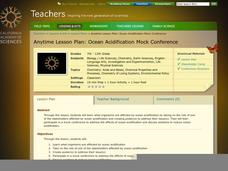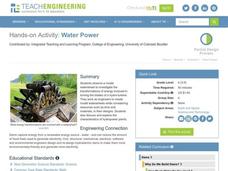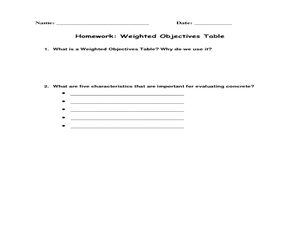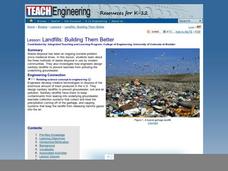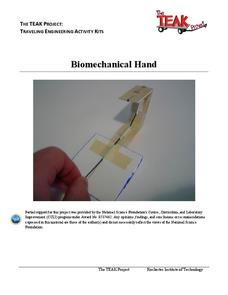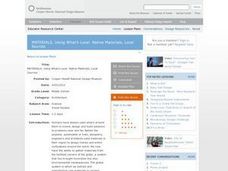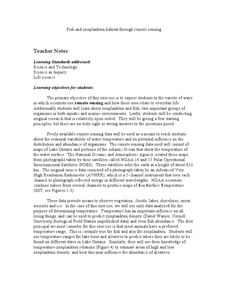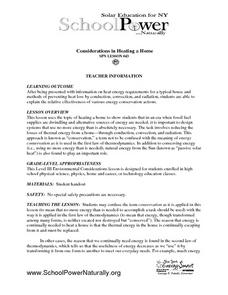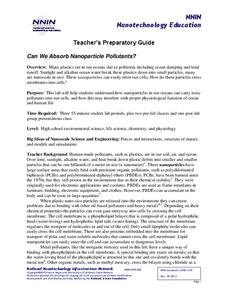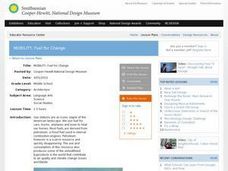California Academy of Science
Ocean Acidification Mock Conference
In a comprehensive role playing activity, teens play the parts of different stakeholders in the realm of acidic oceans. They research, debate, and create a presentation from the perspective of either ocean organisms, the fishing...
Curated OER
Moebius Strips
Students make Moebius strips and use them to demonstrate the interconnectedness of an environment. They explore the natural cycles (water, oxygen/carbon dioxide, carbon, nitrogen) within the environment. They describe how the cycles are...
Teach Engineering
The Great Pacific Garbage Patch
The Great Pacific Garbage Patch is one of several garbage patches around the world where garbage accumulates naturally. As part of a GIS unit that combines oceanography, environmental science, and life science, class members investigate...
Teach Engineering
Water Power
Young hydrologists observe a waterwheel which helps them investigate the transformations of energy that occur when the blades of a hydro-turbine are turning. They work together in pairs and pretend to be engineers who are building a new...
Teach Engineering
The Amazing Aerogel
Introducing ... the aerogel. The first of a two-installment series teaches young engineers about the properties and uses of aerogels. A PowerPoint presentation provides information about this unique material to help solidify the concept.
Curated OER
TE Activity: Stream Consciousness
Fourth graders study how environmental engineers monitor water quality. They use environmental indicators to determine the quality of stream water in their area. They count the number of macroinverabrates and use the information they...
Curated OER
Eek, It leaks!
Young scholars construct model landfill liners out of two-inch strips of garbage bags within resource constraints. The challenge is to construct a bag that will hold one cup of water without leaking. This represents similar challenges...
Curated OER
Weighted Objectives Table and Optimum Mix Sheet
Students analyze data and determine an appropriate concrete mixture. In this technical solutions lesson, students discuss weighted objectives, review sample scenarios, and rate concrete recipes to identify how well water infiltrates....
Curated OER
Green Genes: Genetically Modified Organisms in Our Food
Students investigate how and why genetically modified organisms are used as food crops. They identify the advantages and disadvantages of these crops through internet research then present their views and discuss them as a large group.
Curated OER
Landfills: Building Them Better
Students investigate the three methods of waste disposal. They listen to a teacher-led lecture, answer discussion questions, and write a letter to the E.P.A. from the viewpoint of an environmental engineer.
Curated OER
The Air We Breathe
Students discover the cuases of pollution. They investigate different pollutants that exist. Stsudents research technologies developed by engineers to reduce the amounts of air pollution. Upon completion of assigned activities,...
Curated OER
Are Dams Forever?
Students consider the life span of dams, and what would happen if a dam falls apart. In this environmental impact instructional activity, students discuss what the purposes of dams are, how they could be damaged.
Teach Engineering
Photosynthesis—Life's Primary Energy Source
Wouldn't it be great if you could produce your own food? Scholars learn about the processes of photosynthesis and cellular respiration in plants. They consider how to use photosynthesis as a model of an efficient system and how to apply...
Rochester Institute of Technology
Biomechanical Hand
In 1993, five biomedical engineers in Edinburgh, Scotland, created the first functional bionic arm. In the activity, learners explore the world of bioengineering through discussion and hands-on exploration. In groups, participants...
Teach Engineering
Clean it Up!
Harness the power of bacteria. Scholars see how using organisms that exist in nature can help solve human problems in the process known as bioremediation. They research and discuss several successful examples, such as using oil-eating...
Kenan Fellows
Sustainability: Learning for a Lifetime – The Importance of Water
Water is essential for life—and understanding the importance of clean drinking water is essential in understanding sustainability! Show your environmental science class the basics of water testing and treatment through a week-long...
Curated OER
MATERIALS, Using What’s Local: Native Materials, Local Sources
Students consider the development of different societies. In this environmental building lesson, students consider local resources and how societies choose to use them. Students use their findings to design a 'green' building for use in...
Curated OER
Mission Possible: Energy Trade-offs
Teams of electrical engineers work together to develop plans for increasing electricity to a fictitious, but growing community. They consider different sources of electricity, both renewable and nonrenewable, the cost of building and...
Curated OER
Fish and Zooplankton Through Remote Sensing
Ecology aces examine sea surface temperature maps and relate temperatures to concentration in fish and zooplankton populations. Take your class to a computer lab and provide experience with actual remote sensing data. Some of the links...
Curated OER
Considerations in Heating a Home
Emerging engineers discover how important it is to conserve energy as fossil fuel supplies are being diminished. This is accomplished by working through a handout that explains energy requirements for heating a home during the winter....
California Academy of Science
Climate Change Impacts
Getting kids thinking about climate change now, will hopefully push them into action when they become adults. Young environmentalists discuss the evidence and causes of climate change seen in the state of California. They brainstorm ways...
National Nanotechnology Infrastructure Network
Can We Absorb Nanoparticle Pollutants?
Just because we can't see it doesn't mean it isn't there! A growing concern for environmental scientists is toxic nanoparticles in our air and water. Young scholars conduct an experiment to demonstrate how these particles can cross our...
Curated OER
How Clean is that Water?
Middle schoolers conduct a water quality experiment on a local stream using benthic organisms as a water quality indicator. Based on the results from the experiment, students determine how engineers use this background information to...
Curated OER
Mobility: Fuel for Change
Students determine how to lower the reliance on petroleum-based fuel. In this environmental stewardship instructional activity, students create concept cars for the future that using renewable energy.


